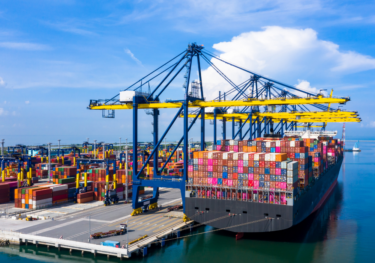Recent Release | 19 Dec 2023
Analysing the German construction industry’s supply chains

Economic Consulting Team
Oxford Economics

The supply chain disruptions triggered by the coronavirus pandemic, the blockade of the Suez Canal, and Russia’s invasion of Ukraine were historically unique for Germany’s construction sector. Our research showed how these supply chain disruptions affected construction companies in various ways and identified strategies to help overcome them.
The dominant effects were higher purchase prices, longer waiting times, and increased resources devoted towards planning. These longer waiting times meant greater difficulties in processing existing orders and a consequent need to forego new orders, which in turn led to a loss of turnover.
Our research also found its supply chain was more globally intertwined than previously understood: the sector generates 40% of gross value added via imported services. Thirteen of the 57 imported intermediate inputs were found to be highly vulnerable. Other industry-specific characteristics include a high level of manufacturing complexity, which leads to a large number of required products. Meanwhile warehousing is often difficult, meaning supply chain interruptions have a direct impact on production capacity.
Our recommendations to the Federal Institute for Research on Building, Urban Affairs, and Spatial Development were that companies should:
- Control their supply chains as completely as possible with digital technologies —from procurement and logistics to delivery to the construction site;
- Use digitalisation to detect disruptions at an earlier stage and react to them;
- Secure greater supply of raw materials through domestic production;
- Replace fossil energy sources with renewable energies;
- Select their suppliers in a diversified manner as far as possible; and
- Promote innovation for new future technologies.
The experts behind the research
Our Economic Consulting team are world leaders in quantitative economic analysis, working with clients around the globe and across sectors to build models, forecast markets and evaluate interventions using state-of-the art techniques. Lead consultants on this project were:

Johanna Neuhoff
Associate Director of Consulting, Economic Impact

Hannah Zick
Economist, Economic Impact

Andy Logan
Director of Industry Consulting
Tags:
Recent related reports

Liberation Day’ tariffs will slow construction rebound
The US will impose a minimum 10% tariff on all trading partners from April 5. Several economies will face larger tariffs from April 9 – some as high as 49%. Some products including steel and aluminium will remain subject to their own fixed tariffs.
Find Out More
Construction Key Themes 2025: Rebound in sight
Global construction activity is forecast to rebound over 2025 as strength in the rest of the world offsets the ongoing Chinese real-estate downturn.
Find Out More
Rough road ahead for US Construction under Trump 2.0
The construction sector has experienced wild ups and downs in recent years, a trend that looks set to continue under the next US administration.
Find Out More
China sectoral implications of Trump 2.0
The incoming Trump administration’s trade policies will have significant impacts on China’s sectoral outlook. There will be a small near-term boost to Chinese output prior to the introduction of tariffs owing to a frontloading of orders. However, the long-term impact will be overwhelmingly negative on Chinese industrial activity.
Find Out More